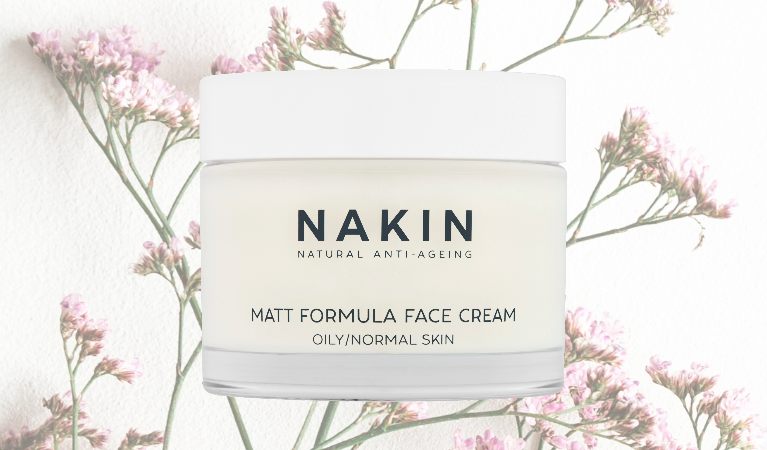Why It’s Better to Use a Separate SPF Sunscreen and Moisturiser Cream

At Nakin one of the most common questions that we receive is about why our face creams do not contain SPF. We understand that lots of people prefer to use a combined face cream and SPF, but at Nakin we do not believe that this is the best way to nourish your face and neck, and protect them from the sun.
All of our creams are free of SPF as they are for day and night use. We recommend only applying SPF when actually going out in the sun, and reapplying during the day as required. Using an SPF in a moisturiser does not usually give enough protection.
We would also not recommend mixing an SPF with a cream. SPF has no benefits for skin, unlike our moisturisers that are packed with skin boosting plant actives and extracts. So, using our moisturisers on their own will give the best nourishment to your skin. Then applying SPF on top only when you are going outside will protect you from the sun, but also not dilute the moisturiser ingredients applied to your face and neck in the morning and evening.
We completely understand that one product seems better to use, the problem is that SPF is not good for our skin and has no benefits, so using a face cream with SPF in is not actually benefiting our skin. If we apply a moisturiser with SPF in at say 7am, but then do not go out in the sun until 9am, then we will have diluted the effects of a good SPF free moisturiser like ours, plus the SPF will also not be giving as strong sun protection as it would be if you applied an SPF only product just before going outside.
Why It’s Better to Use a Separate SPF Sunscreen and Moisturiser Cream
When it comes to skincare, we all want products that are effective, safe, and ethical. That's why many people opt for natural skincare ingredients and pay attention to the brands they support.
But one common mistake that people make is using a moisturiser with SPF as their sole source of sun protection. While this may seem convenient, it's actually not always the best way to protect your skin from harmful UV rays.
The Importance of SPF
SPF, or Sun Protection Factor, is a measure of how well a sunscreen protects your skin from UVB rays. These are the rays responsible for causing sunburn and increasing your risk of skin cancer.
Using a moisturiser with added SPF may provide some protection, but it's often not enough. According to dermatologists we should use a sunscreen with at least SPF 30 for adequate protection.
The Drawbacks of Using a Moisturiser with SPF
Another major drawback of using a moisturiser with SPF is that people tend to apply less than the recommended amount. This means you're not getting enough protection, leaving your skin vulnerable to sun damage.
Additionally, moisturisers with added SPF may not be applied at the right time, which is shortly before going out in the sun. It is also important to use a broad-spectrum protection, which protects against both UVB and UVA rays. UVA rays can cause premature ageing and contribute to skin cancer risk as well.
The Benefit of Using a Separate SPF Sunscreen
Using a separate sunscreen allows you to ensure proper and thorough application for maximum protection. Plus, many sunscreen formulas now include moisturising ingredients, so you can still get the hydration your skin needs.
It's also worth noting that using a separate SPF sunscreen allows you to choose from a wider range of options. You can find sunscreens specifically formulated for your skin type and preferences, such as tinted versions.
While using a moisturiser with added SPF may seem convenient, it's important to prioritise the health and protection of your skin by using a separate sunscreen. With the right SPF level and broad-spectrum protection, you can confidently enjoy time outdoors while keeping your skin safe from harmful UV rays. Don't compromise on proper sun protection - choose a separate sunscreen and prioritise the health of your skin. So, remember, when it comes to SPF protection, two is better than one. Be sure to use a separate sunscreen with at least SPF 30 for maximum effectiveness. Your skin will thank you in the long run.
Find out more about our range of natural anti-ageing face products online at www.nakinskincare.com


Comments on this post (2)
Hi Shine,
Thank you for getting in touch.
At Nakin we always recommend a separate moisturiser and sunscreen, as a moisturiser helps with hydration, nourishment and general protection. However, a sunscreen is only there to do one job, and that is protect skin from the sun. When SPF is used as part of a moisturiser we tend to not apply enough, and it tends to be at different times to when we are actually going outside. So, in general a sunscreen as part of a moisturiser does not give enough protection, and it also limits the amount of skin enhancing actives and extracts that can be put into the moisturiser.
We do not have a sunscreen in our moisturisers, as our creams are for both day and night use. They contain lots of amazing natural actives and extracts that benefit skin in both the day and night, and we prefer to fill them with as many skin boosting natural actives and extracts as possible. We do not recommend using an SPF in a face cream and instead we recommend only using SPF when actually going outside, and reapplying SPF in the day as required.
Everything in our range can be found here https://www.nakinskincare.com/collections/natural-anti-ageing-skincare
We hope that this answers your query and please let us know if we can help further.
Kind regards,
Nakin
— Nakin
Hi I need help I need to help to buy a face moisturizer also sunscreen so I have combination skin and I am thinking to use for my face moisturizer with SPF like CeraVe face moisturizer with SPF 50 or shall I use moisturizer lotion for face and use separate SPF something recommended to use for my face I have also sensitive skin I suffer acne when I was young now my face ok from acne I am 42 years old.Please help me for right product to get for my face.
— Shine